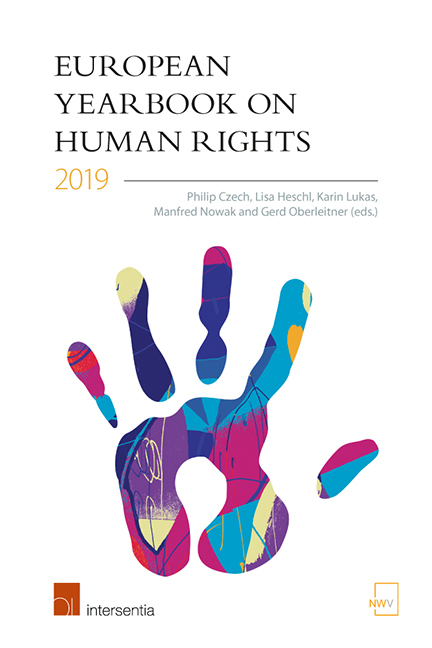Book contents
- Frontmatter
- Miscellaneous Frontmatter
- Editors’ Preface
- Contents
- List of Abbreviations
- List of Contributors
- PART I TOPIC OF THE YEAR
- PART II EU
- PART III CoE
- The Jurisprudence of the European Court of Human Rights in 2018
- Blasphemy and the European Court of Human Rights: A Small Step Forward, a Giant Leap Back
- How Do European Courts Approach the Sensitive Topic of Same-Sex Marriage? An Analysis of the Case Law of the ECtHR and the CJEU in the ‘Catch 22’-Field of Equal Marriage Rights
- The European Court of Human Rights and the Human Rights Model of Disability: Convergence, Fragmentation and Future Perspectives
- The Undermining of Article 6 ECHR
- The Right to a Nationality in Recent Case Law of the European Court of Human Rights and Council of Europe Bodies’ Work
- PART IV OSCE
- PART V REPORTS FROM THE FIELD
- PART VI OTHERS
- PART VII BOOK REVIEWS
- Index
Blasphemy and the European Court of Human Rights: A Small Step Forward, a Giant Leap Back
from PART III - CoE
Published online by Cambridge University Press: 24 January 2020
- Frontmatter
- Miscellaneous Frontmatter
- Editors’ Preface
- Contents
- List of Abbreviations
- List of Contributors
- PART I TOPIC OF THE YEAR
- PART II EU
- PART III CoE
- The Jurisprudence of the European Court of Human Rights in 2018
- Blasphemy and the European Court of Human Rights: A Small Step Forward, a Giant Leap Back
- How Do European Courts Approach the Sensitive Topic of Same-Sex Marriage? An Analysis of the Case Law of the ECtHR and the CJEU in the ‘Catch 22’-Field of Equal Marriage Rights
- The European Court of Human Rights and the Human Rights Model of Disability: Convergence, Fragmentation and Future Perspectives
- The Undermining of Article 6 ECHR
- The Right to a Nationality in Recent Case Law of the European Court of Human Rights and Council of Europe Bodies’ Work
- PART IV OSCE
- PART V REPORTS FROM THE FIELD
- PART VI OTHERS
- PART VII BOOK REVIEWS
- Index
Summary
ABSTRACT
Time and again (e.g. in such cases as X. Ltd. and Y. v United Kingdom, Otto-Preminger-Institut v Austria, Wingrove v United Kingdom, and İ.A. v Turkey) the European Court of Human Rights has accepted that responding states legitimately interfered with free speech in the interest of protecting the sensitivities of religious believers. Individual ECtHR judges have, in their dissenting opinions, lamented that ‘the time has perhaps come to “revisit” this case-law, which in our view seems to place too much emphasis on conformism or uniformity of thought and to reflect an overcautious and timid conception of freedom of the press’ (I.A.). In this contribution, scrutinising the most recent instalments of the Strasbourg Court's jurisprudence on speech acts alleged to insult religious sentiments (including, E.S. v Austria and Mariya Alekhina and Others v Russia [Pussy Riot]), it will be ascertained if and to what extent the European Court of Human Rights is indeed revisiting its jurisprudence in this area.
INTRODUCTION
The European Court of Human Rights’ (ECtHR) freedom of expression case law is notoriously troublesome. Ever since the Handyside case, the first landmark judgment on freedom of expression, the Strasbourg Court has paid ample lip-service to freedom of expression as the cornerstone of a democratic society and specifically to the mantra holding that free speech protection is ‘applicable not only to “information” or “ideas” that are favourably received or regarded as inoffensive or as a matter of indifference, but also to those that offend, shock or disturb the State or any sector of the population. Such are the demands of that pluralism, tolerance and broadmindedness without which there is no “democratic society”’’. The reality is that ever since Handyside – in fact, including that judgment in which the Court distils insurmountable ‘ethical’ objections from what was essentially a harmless sex education booklet – hardly ever do offensive, shocking, or disturbing statements trigger robust free speech protection by the highest European human rights court.
The upshot thereof is, it will be argued in this contribution, that the Strasbourg Court at times fails to protect speech acts – protect especially those speech acts4 – that are not favourably received.
- Type
- Chapter
- Information
- European Yearbook on Human Rights 2019 , pp. 221 - 236Publisher: IntersentiaPrint publication year: 2019



